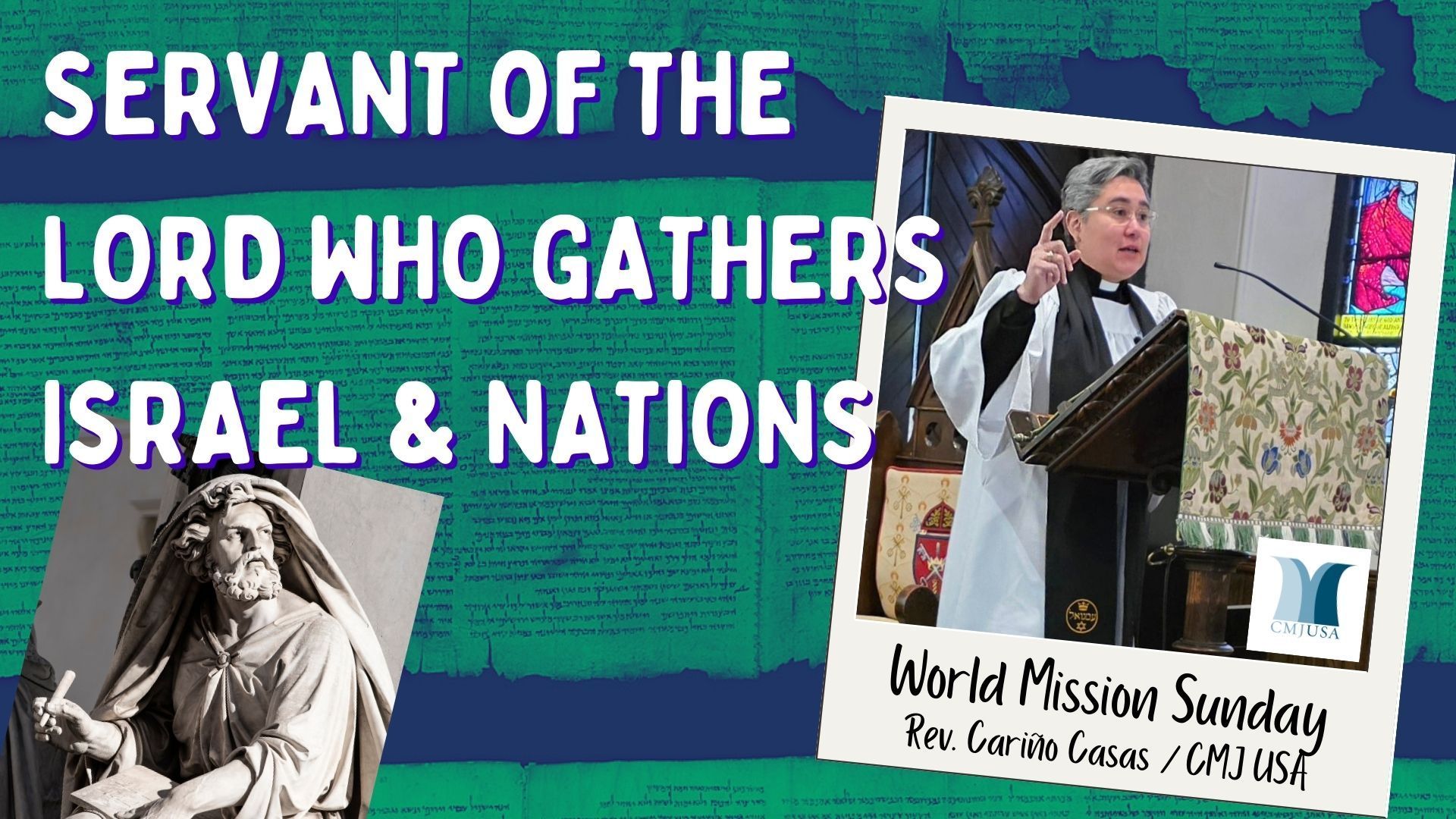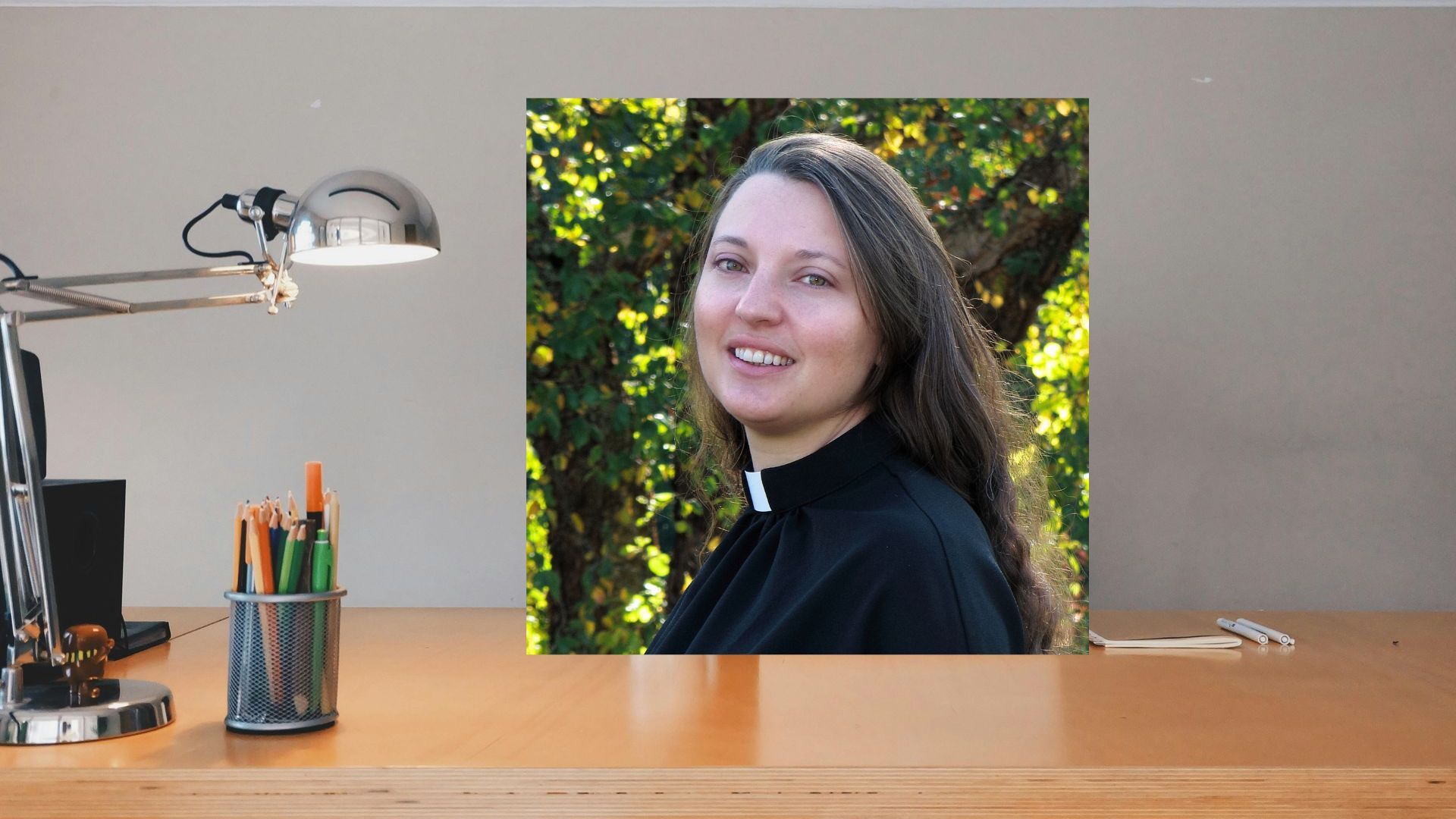Yeshua of Nazareth, the Prophet Like Moses
Editor's note: The Torah Guide , founded by Aaron Dranoff, exists to help people read the Hebrew Bible and discover Jesus. Aaron is a Jewish believer in Jesus who shared his testimony with us earlier. CMJ USA is proud to partner with Aaron and his ministry. Scroll down to read the transcript of Rev. Cariño Casas' teaching.
By Rev. Cariño Casas
CMJ USA
In Deuteronomy, the fifth book of the Torah, Moses is giving his last instructions to the children of Israel before he dies. In chapter 18, Moses declares an interesting promise from God. Reading verses 15-19 from the Jewish Publication Society version:
The LORD your God will raise up for you a prophet from among your own people, like myself; him you shall heed. This is just what you asked of the LORD your God at Horeb, on the day of the Assembly, saying, "Let me not hear the voice of the LORD my God any longer or see this wondrous fire any more, lest I die." Whereupon the LORD said to me, "They have done well in speaking thus. I will raise up a prophet for them from among their own people, like yourself: I will put My words in his mouth and he will speak to them all that I command him; and if anybody fails to heed the words he speaks in My name, I myself will call him to account.
Some in Judaism have said this promise was fulfilled in the succession of prophets recorded in the Hebrew Scriptures. The Jewish sage Rashi said of this passage: “This means: Just as I am among you, from your brothers, so will He set up for you [another prophet] in my stead, and so on, from prophet to prophet.” [1]
But others in Judaism had grander expectations. The Dead Sea Scroll community was looking for a last-days messiah figure. The Samaritans of Jesus’ day were looking for the Prophet who would restore all things for God. [2] And medieval Rabbi Levi ben Gershon also known as Ralbag, believed that Moses was speaking of King Messiah. [3]
Did Jesus say he is the Prophet Like Moses? His life and actions proclaimed his identity as the Prophet Like Moses. Some who encountered Jesus affirmed this in their words and deeds. The writers of the New Testament understood this and recorded it. Let’s look at three voices found in the New Testament that proclaim Jesus as the fulfillment of Deuteronomy 18:15.
- King Herod and the murder of the innocents
- The Samaritan woman at the well
- The Voice from heaven at the Transfiguration
Let us start just after Jesus’ birth. Jesus was born in Bethlehem to Mary, a virgin from Nazareth. Joseph, Mary’s husband, knew from a dream that Jesus was conceived by the Holy Spirit. Joseph and Mary do everything required by the Torah after Jesus’ birth, including circumcising him on the eighth day and offering a purification offering for Mary 40 days after the birth.
Sometime after that, Joseph has another dream warning him that King Herod wants to kill baby Yeshua, or Jesus. Herod has heard from some foreign holy men that the King of the Jews has been born, and Herod wants NO rivals. Joseph, Mary, and infant Jesus escape to Egypt, “to the land of the pharaohs and the birthplace of Moses.” [4]
At the time Moses was born, Pharoah was suspicious and even paranoid that the Israelite slaves were growing to a dangerous number. He ordered all male Israelite infants drowned in the Nile River. But Moses’ parents hid their newborn son, first at home, then in Pharoah’s court! And so Moses, deliverer of Israel, survived.
In Jesus’ day, Herod was just as ruthless. He ordered that all male children under two years old in and around Bethlehem be killed. But Jesus and his family were already safe in Egypt.
Herod, by repeating Pharoah’s murder of Israelite infant boys, points to Jesus’ identity as the Prophet Like Moses. The family returns to Nazareth after King Herod dies.
The second witness to Jesus being the Prophet Like Moses is unexpected in two ways: she is a woman and she is a Samaritan.
The Samaritans were Israelites, not Gentiles. But Jews and Samaritans hated each other. The ancient hostility went back more than a thousand years. “This hostility was religious and cultural in nature. The Israelite kings had been idolatrous and established alternatives to the temple in Jerusalem. These Israelites, now called Samaritans, did not accept any Scriptures except their own version of the [Torah]. … They were viewed as unclean by the Judean Jews.” [5] Yet, Jesus, a Jew, asks this Samaritan woman for a drink of water. This clues her that there is something different about this Jew.
The Samaritans did read Torah, even as they rejected the other writings Jews consider Scriptures. So they knew that God had promised a prophet like Moses. The Samaritans called him the Restorer. A sign of his identity would be supernatural knowledge.
Jesus and the Samaritan woman have a conversation about water. It starts with Jesus asking her for a drink from the well. It ends with the woman asking Jesus for some of his eternal water. From John 4:
“Sir, give me this water, so that I will not be thirsty or have to come here to draw water.” Jesus said to her, “Go, call your husband, and come here.” The woman answered him, “I have no husband.” Jesus said to her, “You are right in saying, ‘I have no husband’; for you have had five husbands, and the one you now have is not your husband. What you have said is true.” The woman said to him, “Sir, I perceive that you are a prophet.”
They keep talking, about their different religions, no less. Then she says, “I know that Messiah is coming (he who is called Christ). When he comes, he will tell us all things.” Jesus said to her, “I who speak to you am he.”
At this, the woman runs back to town, calling “Come, see a man who told me all that I ever did. Can this be the Messiah?”
Why did the woman believe? Because Jesus had supernatural knowledge about her life. They’d never met, but he knew all about her. It was enough for her to proclaim him as the Restorer, the Prophet Like Moses, to her Samaritan town.
The final witness we’ll consider today is the Voice from Heaven in the reports of the Transfiguration recorded by three Gospel writers. We’ll look at Matthew’s account.
Jesus takes his three closest students – Peter, James, and John – up on a high mountain. From Matthew 17:
And he was transfigured before them, and his face shone like the sun, and his clothes became white as light. And behold, there appeared to them Moses and Elijah, talking with him. … behold, a bright cloud overshadowed them, and a voice from the cloud said, “This is my beloved Son, with whom I am well pleased; listen to him.”
For a few moments, the three trusted disciples see Jesus in his eternal state, the radiant Son of Man from Daniel 7. THEN, Moses and Elijah join the mountain-top meeting. When the brilliance is too much for the disciples to bear, a cloud moves in and a Voice from heaven speaks.
The one sentence uttered by God himself tells the disciples and us exactly who Jesus is by pointing to three passages in the Hebrew Scriptures.
- “This is my beloved Son” – This is a reference to Psalm 2, a coronation song for King David and his descendants. The king of Israel is called “Son of God.” So God is saying Jesus is the King of Israel.
- “with whom I am well pleased” – This comes from Isaiah 42:1, where God says that he delights in his chosen servant spoken about throughout Isaiah, even the Suffering Servant of Isaiah 53 who atones for the sins of Israel. In Luke’s account of the Transfiguration, the conversation between Jesus, Moses, and Elijah is about Jesus’ impending suffering and death in Jerusalem.
- “listen to him” – The third part of the Voice’s sentence comes from the LORD’s promise of a Prophet like Moses in Deuteronomy 18, where the LORD says “to him you shall listen.”
God the Father himself proclaims that Jesus is the Prophet Like Moses he promised in the Torah, and he does it in front of Moses!
That Jesus is the Prophet Like Moses is clearly taught by Peter – who heard the Voice from heaven – and Stephen, who is the first Jew to die for proclaiming that Jesus is the Messiah and the Prophet Like Moses. You can read their sermons in Acts 3 and Acts 7.
Jesus says in his most famous sermon, “Do not think that I have come to abolish the Torah or the Prophets; I have not come to abolish them but to fulfill them.” He might have said it another way: “I have not come to replace Moses but to fulfill his words.”
I am indebted for Dr. Jim Sibley of Israel College of the Bible for his insights on this topic. Read 12 teachings on the Prophet Like Moses by Dr. Sibley here.
The Rev. Cariño Casas is the Executive Director of CMJ USA. She joined the CMJ family in 2014 as the media coordinator of Christ Church Jerusalem. She has a Master of Arts in Biblical Studies from Trinity School for Ministry and a Bachelor of Arts in Journalism from Texas A&M University. She is the deacon at Grace Anglican Church in Edgeworth, Pennsylvania.
Footnotes
- Rashi Commentary on Devarim (Deuteronomy) 18:15, The Complete Jewish Bible with Rashi Commentary , Chabad.org. Retrieved 11 Nov 2023. https://www.chabad.org/library/bible_cdo/aid/9982/showrashi/true#lt=primary
- Jim R. Sibley, “Deuteronomy 18:15–19: The Prophet like Moses,” in The Moody Handbook of Messianic Prophecy: Studies and Expositions of the Messiah in the Old Testament , ed. Michael Rydelnik and Edwin Blum (Chicago, IL: Moody Publishers, 2019), 335.
- Ralbag Beur HaMilot on Torah, Deuteronomy 34:10, Seferia.org. Retrieved 11 Nov 2023. https://www.sefaria.org/Ralbag_Beur_HaMilot_on_Torah%2C_Deuteronomy.34.10.1 . ; Sibley, Moody Handbook , 335.
- Jim R. Sibley, “Yeshua, the Prophet-Like-Moses, Is Born!” CMJ USA . Retrieved 11 Nov 2023. /blog/yeshua-prophet-moses-born.
- Jim R. Sibley, “The Prophet-Like-Moses Offers Water to an Israelite.” CMJ USA . Retrieved 11 Nov 2023. /blog/prophet-moses-offers-water-israelite.
Blessed by this post? Ready to sow into the work of CMJ? No gift is too small. we are blessed by your partnership.



